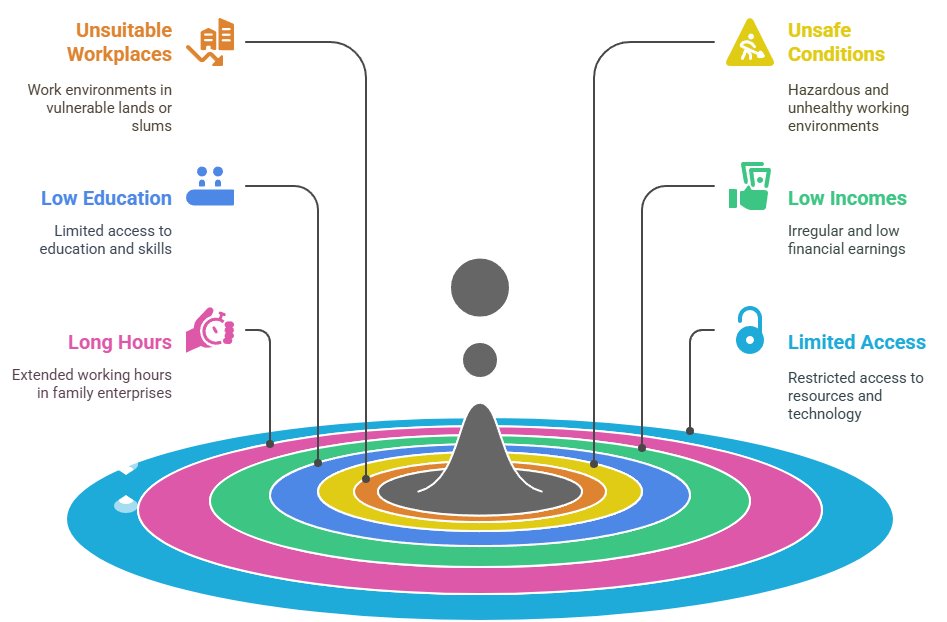 The Informal Sector

 The informal economic sector is directly and indirectly addressed in many of the Sustainable Development Goals (SDGs), particularly through SDG #8: "Promote sustained, inclusive and sustainable economic growth, full and productive employment and decent work for all"
The informal economic sector is directly and indirectly addressed in many of the Sustainable Development Goals (SDGs), particularly through SDG #8: "Promote sustained, inclusive and sustainable economic growth, full and productive employment and decent work for all"
Roughly half the worlds population still lives on the equivalent of about US$2 a day. And in too many places, having a job dosent guarantee the ability to escape from poverty. Substandard working conditions are often related to poverty, inequality and discrimination. These are the conditions within which the informal sector performs.
Considering that most of the target population for meeting the SDG #8 are poor or work in the informal sector, it is logical that the two themes are intrinsically linked. Work in the informal economy can be characterized as:
We need to remember that conditions in the informal are less than ideal, since workers are usually not recognized, licensed, regulated or otherwise protected under labour legislation and social protection systems." - making them the ideal targets for SDG #8.
 Figure 1: Characteristics of the informal economy
For example, Target 8.3 call for governments to promote development-oriented policies that support productive activities, decent job creation, entrepreneurship, creativity and innovation, and encourage formalization and growth of micro-, small- and medium-sized enterprises including through access to financial servicesE/em>. While the indicator designated for this target is "Proportion of informal employment in non-agriculture employment, by sex", it is clear that broader informal economic activities, particularly in urban areas also need to be looked into and targeted.
Since the informal sector represents the developmental challenges of poverty, disadvantaged sections of the population, job creation, economic growth, et. al, ensuring that the sector is a priority for government programmes also concerns other SDGs as well - SDG 1 on poverty, SDG 5 on gender equality, SDG 10 on equality, SDG 16 on institutions, and SDG 17 on partnerships, among others.
The full list of 12 Targets under Goal 8 are:
Please note - indented text listed below are comments that illustrate the link between decent work and informal sector activities, and are not part of the actual SDG#8's official text.[1]
Take into account the economic output that the informal sector generates (not counted at present) in promoting economic growth, including "formalizing" the informal sector without loosing its essential benefits [1]
Informal sector activities are intrinsically labour intensive - and efforts need to be directed to improve their efficiency and productivity, including the use to appropriate and environmentally sound technologies.
Efforts to promote policies to support job creation and enterprise development within the informal sector will take advantage of the inherent dynamics of the sector, and will also target other SDGs, such as poverty reduction.
Many informal sector activities, due to the restricted market conditions that they operate, not only use resources efficiently, but reuse and recycle materials extensively. This has to be acknowledge and made more efficient to enable the sector to contribute to the Target's achievement.
This target should obviously include workers in the informal sector, who operate within their own unique set of disadvantages and disincentives. Considering the large numbers of people involved, particularly in developing countries, "decent work" takes on an additional but necessary challenge for governments to assist the informal sector.
Such NEET youth (not-in-employment-education-training) are in fact, in a majority of cases, underemployed in the informal sector, particularly in urban areas of developing countries, but which are not counted in tabulating national economic data). Enhancing their job status, skills and capacities to work in the informal sector should be an important policy objective.
Some informal enterprises are indeed involved in such illegal labour practices, particularly in family-owned/run enterprises. Targeting such practices and countering it with positive and progressive policies that improve their economic, social and environmental conditions will be critical policy approach for local governments to achieve this target.
Considering the disadvantageous and exploitative conditions that informal enterprises operate in, including corruption, much of this Target's actions on protecting labour rights and related issues, need to be focussing on the conditions in the informal sector.
Informal sector workers, particularly in large cities, are in a majority of cases, migrants from smaller towns and villages. They bring along with them their cultures and heritage assets with them when they migrate. These assets form ideal resources to be taken advantage of for the purposes of responsible, sustainable and pro-poor tourism development policies.
Due to a lack of access to formal financial institutions, informal enterprises invariably set up mutual-aid or other forms of informal finance systems that will be able to serve them/. With the recent advent of microcredit and microfinance systems that target the poor, these systems need to be understood better and integrated and formalized into the mainstream, so as to be better able to serve the informal sector.
More than 70-90 percent of economic activities in Least Developed Countries (LDCs) are in fact informal. This means that any action to increase aid for trade support has to logically take into consideration the position and contribution of the informal sector.
Inherently for LDCs, measures under this Target should take the informal sector into consideration to accelerate the economic recovery of the their economies.
ILO. Formalization of the informal economy: Area of Critical Importance (GB.325.POL.1.1). Geneva : ILO, 2015.
SDG Compass (2020), SDG 8: Promote sustained, inclusive and sustainable economic growth, full and productive employment and decent work for all. Retrieved from https://sdgcompass.org/sdgs/sdg-8/on 30 July 2020.
United Nations, SDG8: Progress of goal 8 in 2019. United Nations: SDG Knowledge Platform Further reading: https://sustainabledevelopment.un.org/sdg8
| ||||||||||||||||||||||||
|
